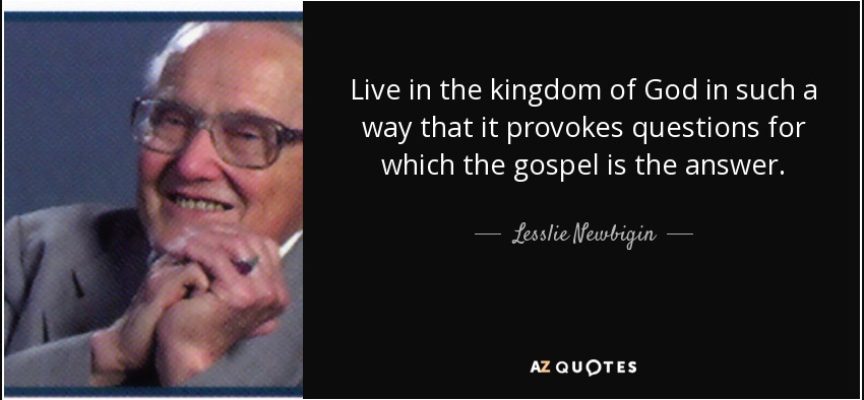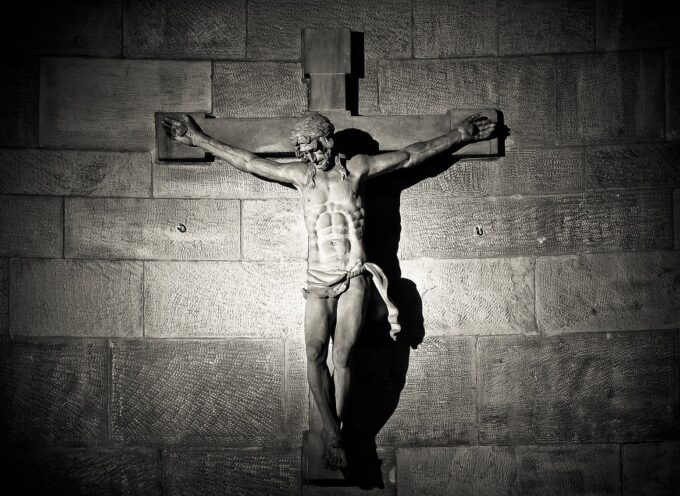As a Christian citizen of the United States, it is clear to me that I am living in an increasingly post-Christian society. The majority of Americans no longer consider traditional Christian doctrine (e.g. original sin) or traditional Christian ethics (e.g. sexual morality) plausible in the modern world. Christians who do not abandon these beliefs are increasingly considered morally inferior or even hateful.
Given the fact that the United States is a democratic republic, the beliefs of citizens affect the lives of other citizens socially, culturally, and politically. This reality makes it increasingly important for us as Christians to figure out the best way to comport ourselves in the public square. I consider three thinkers especially helpful for this task: Richard John Neuhaus, Lesslie Newbigin, and Abraham Kuyper. In this post, I wish to articulate what it is about Newbigin’s life and writings that is helpful for us in our 21st century American context.
Newbigin’s Life and Writings
I first discovered Newbigin in 1997 while reading for my M. Div. at Southeastern Seminary. I began to read his work in earnest about 15 years ago, and have appreciated especially Truth to Tell: The Gospel as Public Truth, Foolishness to the Greeks: The Gospel and Western Culture, and Signs amidst the Rubble: The Purposes of God in Human History. Equally, I appreciate his life.
Newbigin was born in England, ordained by the Church of Scotland in 1936. He served as a missionary in India for years. In 1947, he was ordained a bishop of the Church of South India. He went to become a widely (and wildly) popular missiologist and public theologian, even being elected as general secretary of the International Missionary Council and associate general secretary of the World Council of Churches.
In fact, When he spoke at the WCC Conference on World Mission and Evangelism (Salvador, Brazil) in December of 1996, Raymond Singh writes that, “When it came to the presentation by Bishop Lesslie Newbigin, he was given a standing ovation lasting many minutes and spoke for an hour without any notes. His message was that the task of mission is to recover the power of the gospel and not to encourage privatized faith.”
In 1974, Newbigin returned to Britain where he took up a post as lecturer at Selly Oak College. His speaking engagements and publications reveal that his interest turned more fully to public theology. In particular, he challenged Western Christians to recover the gospel as public truth and to articulate a framework for Christian mission in the increasingly plural late 20th century context. Newbigin wanted Western Christians to foster a genuine missionary encounter between the Lord Christ and the secular West.
Pluralism & the Public Square
Newbigin was similar to Richard John Neuhaus in his rejection of the Enlightenment’s fact/value dichotomy and its subsequent cultivation of a supposedly neutral public square. For Newbigin, as for Neuhaus, there is no such thing as a neutral public square. Every human being is a worshiper. Each of us has a fundamental heart orientation with accompanying convictions, and our orientation and convictions radiate outward into all we do.
Newbigin endorsed principled pluralism more consistently than Neuhaus, and his public square writings were focused on situations in which Christians find themselves in the minority. Newbigin believed Christians should take a missionary posture in the public square, focusing on the message of the gospel and demonstrating its relevance as public truth. In order to do so, they must gain a depth-level understanding of their cultural contexts so that they can proclaim the gospel and work out its implications in a manner faithful to Scripture and meaningful in the cultural context.
Newbigin was not opposed to a Christian state, but he was opposed to a theocracy. As we will see in a moment, but he makes clear that the church should not impose gospel convictions on those who are not Christians. The institutional church should not directly influence public policy. Instead, the institutional church should equip individual Christians to reflect upon, and act in, public life in a theologically-sound and gospel-centered manner.
Can a Modern Society Be Christian?
Although Newbigin’s most influential publications are book-length treatises, one of the most helpful encapsulations of his thoughts on Christianity and public life can be found in a brief essay, “Can a Modern Society Be Christian?” For the purpose of introducing some of his most important and recurring thoughts, I will provide here a distillation of the article, followed by a few comments about the significance of its central ideas.
Newbigin begins the article by noting that late modernity cannot be reconciled with Christianity. Both Christianity and modernity are missionary faiths, and both make universal claims which they see as valid for all people everywhere. For years, Christian thought leaders have tried to help Christianity survive in the modern world by confining it to the realm of inner experience, by domesticating it so that it doesn’t make any claim on public life. But this sort of privatization and domestication of Christianity reduces its central claims—that Christ is the cosmic King and the gospel is public truth.
Newbigin addresses this situation by reminding us of the Bible’s claim that God’s kingly rule has been manifested in Jesus. The implication for Christians is that they must allow their Christian beliefs to shape their words and actions in public life, and they must allow other-believers the same freedom to bring their beliefs to the public square. In other words, they must work toward building a Christian society but not a theocratic one.
When Christians are in a position to exercise authority, they must do so on the basis of that which has been revealed in Jesus Christ as God’s purpose for human life, but in so doing they are required to give to all under their political authority the same freedom to dissent as God gives to us in the incarnation of his word in Jesus.
When Christians find themselves in positions of political power and responsibility, they are bound by the gospel to use that power in a manner confluent with the Christian understanding of God’s purposes for human flourishing.
Newbigin encourages British Christians to build for a healthy Christian society, and does so by means of five directives. First, Christians must recover the belief that the gospel is a public truth and the norm by which all other claims are judged. Elsewhere, he put it this way:
When the church affirms the gospel as public truth it is challenging the whole of society to wake out of the nightmare of subjectivism and relativism, to escape from the captivity of the self turned in upon itself, and to accept the calling which is addressed to every human being to seek, acknowledge, and proclaim the truth. For we are that part of God’s creation which he has equipped with the power to know the truth and to speak the praise of the whole creation in response to the truthfulness of the Creator.
So the gospel is a public truth good for people of all times and places.
Second, the church must once again become an evangelizing community. If the gospel is public truth, it should be made known to everybody. “The Gospel is only known to be true,” Newbigin writes, “when it is experienced as the liberating power that it is. Evangelisation is the antidote to domestication. The power of the Gospel as liberating truth, as release from illusion and alienation, as light out of the darkness and confusion, is known when people are receiving it as news.”
Third, the church must “de-clericalize” theology. By this, Newbigin means that the church must equip believers to bring the gospel to bear upon their secular responsibilities, including their workplaces and public square interactions. He notes that British believers would be well-served to draw upon the Kuyperian tradition to do so.
Fourth, Christians must pledge allegiance to Christ but affirm the right of others to hold and express different beliefs. Newbigin was committed to public pluralism. A healthy Christian society should maximize the possibilities for face-to-face public square conversation. Christians should not suppress or exclude those who dissent, but should publicly reason with other-believers to persuade them that the Christian vision of the good life is one which causes all members of society to flourish.
Fifth, Christians must be prepared for debate and controversy. They must cultivate godly virtues such as courage and compassion. They must develop spiritual capacities for the invisible spiritual warfare that take place when the gospel breaks into a godless society. They must build the intellectual and rhetorical capacities necessary to convey the Christian vision of the good life appropriately and compellingly in their society.
Newbigin knew that he was not a political philosopher or a political scientist. Neither in this essay nor in any of his publications did he try to develop a political program or agenda. Instead, he called Christians to recognize the gospel as public truth, preach it as such, and apply it to matters of public concern.
Conclusion
I am grateful for Lesslie Newbigin’s approach to public theology. He argued clearly, consistently, and compellingly that we need to recover the recognition that the gospel is public truth. He reminded us that, in our recovery of the gospel as public truth, we should not allow ourselves to be lured by theocratic temptations. He urged us to value a public pluralism in which Christians have the opportunity to venture into the public square, drawing upon their Christian beliefs in order to reason and persuade others toward their vision of the good life. In short, Newbigin’s life and writings remind us of the value of cultivating a public theology and of raising up public theologians who can speak and act in the public square for the common good.
[Note: A version of this article was originally published at Canon & Culture.]
Subscribe
Never miss a post! Have all new posts delivered straight to your inbox.







